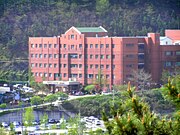Dongguk University
동국대학교 (東國大學校) | |
| File:Dongguk logo.gif Logotype of Dongguk University | |
Former names | Myungjin School (1906-1940) Hyehwa Professional College (1940-1946) Dongguk College (1946-1953) |
|---|---|
| Motto | 攝心, 信實, 慈愛, 度世 |
| Type | Private |
| Established | May 8, 1906 |
| President | Kim, Hee-Ok |
| Undergraduates | 17,189 (2009)[1] |
| Location | , |
| Campus | Urban |
| Affiliations | Mahayana Buddhism |
| Mascot | Elephant, Lotus |
| Website | English website Korean website |
 | |
| Dongguk University | |
| Hangul | 동국대학교 |
|---|---|
| Hanja | |
| Revised Romanization | Dongguk Daehakgyo |
| McCune–Reischauer | Tong'guk Taehakkyo |
Dongguk University is a private, coeducational university in South Korea. It operates campuses in Seoul, in Gyeongju City, North Gyeongsang province and in Los Angeles, United States. In addition, it operates two affiliated hospitals of Western medicine, and four of Oriental medicine, a generic term which includes Traditional Korean medicine studies.
Location
Dongguk university is located in Jung-gu, Seoul just north of Namsan. The upper buildings of the campus are directly connected into the trails of Namsan park.
As the school is within the center of Seoul, two of the main shopping districts Dongdaemun to the north and Myeongdong to the west are near the university gates. The Seoul campus' main entrance is at Dongguk University Station the intersection of Seoul Subway Line 3 and 4. while Chungmuro Station is near the rear entrance.http://www.dongguk.edu/eng_html/about/campusmap.jsp
History
Dongguk University provides a world-class education that bridges East and West on many levels.
Founded in 1906 by Korea's ecumenically minded Jogye Order, Dongguk remains one of the few Buddhist affiliated universities in the world. Yet its doors have always been open to students and teachers of all faiths and philosophies. Students and professors from around the globe enhance the quality of education on each of Dongguk's four campuses by bringing together dramatically diverse life experiences and cultures in a common educational mission. Graduate and undergraduate students alike are exposed to the latest theories and practical training in every area of university study.
Dongguk consistently ranks among Korea's top universities. Yet an equally important ingredient in any collegiate experience is development of the self, a maturing process enhanced by exposure to people of diverse backgrounds, opinions and value systems. For thousands of new students each year, Dongguk continues to serve a great first step on a lifelong journey of self-discovery, service to others, and spiritual enlightenment.
The university began as Myeongjin School (명진학교) on May 8, 1906. It was closed by the Japanese Occupation Government from 1922 to 1928, after the Samil Undong uprising, and again in 1944, in relation to the turbulent events surrounding the end of World War II. It was one of the first institutions in the Republic of Korea to gain university status, in the western sense, being designated a university in 1953. The postgraduate school opened simultaneously. During the Korean War, classes were held in Busan, but were moved back to Seoul again in 1953. In 1959, the Dongguk university Broadcasting system was initiated. The College of Education was launched in 1968 with 4 courses, adding Education of Physical Education a year later.[2] In 1978, the Gyeongju Campus was established.
School Spirit
School Precepts
Seop-sim : Steady one's clean mind
Sin-sil : Behave truly and reliably
Ja-ae : Love people with benevolence
Do-se : Save mankind from agony
Foundational Spirit
The foundational spirit of Dongguk University is summed up in three educational goals : to build up one's character based on the Buddhist virtues ; to make the nation, mankind, and nature full of wisdom and benevolence ; and to realize the ideal society in which people can trust and respect each other.
Educational Purpose
Following the foundational spirit, the University aims at making the Buddhist spirit and the Korean culture known worldwide, and further at cultivating persons of talent with leadership skills, who will devote themselves to realizing ideals of the nation and mankind by researching and teaching academic theories and their application methods.
Symbol
Elephant
Dongguk's symbol animal is an elephant which is considered a holy animal with wisdom and fortune. It intends to describe modern, progressive and active characteristics, and it also expresses university students of the new generation who are wise, brave, bright and friendly.
Lotus
Dongguk's flower is a lotus blossom which is the emblem of Buddhist truth.
Notable Students
Sun-Mi
Seohyun
Gayoon
Lee Seung Gi
Yoona
Han Hyo-joo
Academics
Undergraduate collegesSeoul Campus
Gyeongju Campus
Los Angeles, USA Campus
Graduate schoolsSeoul Campus
Gyeongju Campus
Los Angeles, USA Campus
|
-
Campus of Dongguk University in Gyeongju at night
-
Main square of Dongguk University.JPG
-
Main Square in front of the Main Building.
-
University Medical School
-
Dongguk University Hospital.JPG
-
University Hospital.
-
One of the auditorium in the University
-
Dongguk University Gyeongju.JPG
-
Students' square in front of the Humanities building.
-
University Dormitory
-
Natural Sciences Building Dongguk University.JPG
-
Natural Sciences Building.
-
University Symbol statues on Campus
-
Students resting area dongguk university.JPG
-
One of the many students areas.
-
Dongguk University Library
-
Bicycle parking Dongguk University.JPG
-
Bicycle Parking on campus.
See also
- List of colleges and universities in South Korea
- List of Korea-related topics
- Education in South Korea
- Gyeongju
References
This section needs additional citations for verification. (January 2009) |
External links






